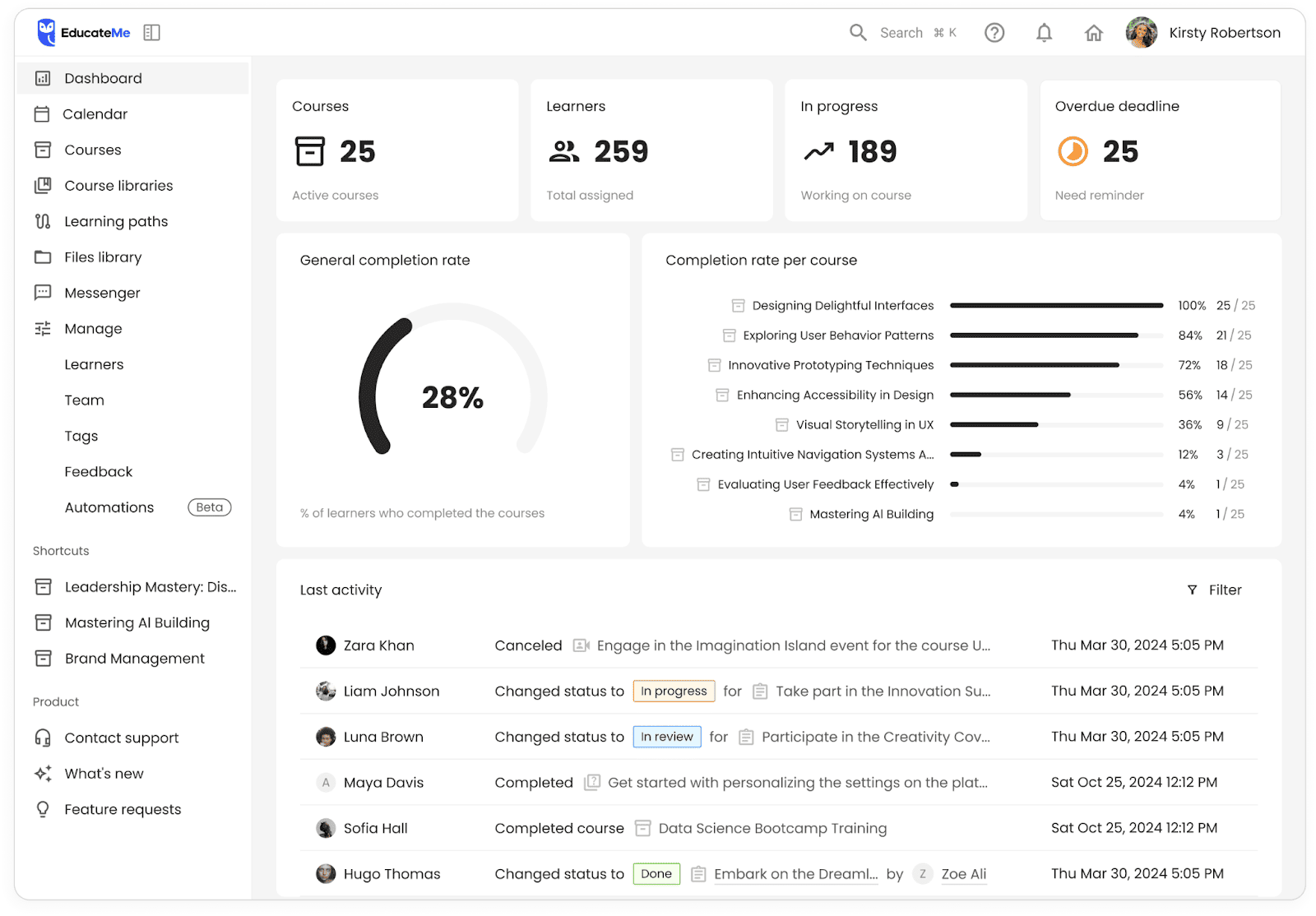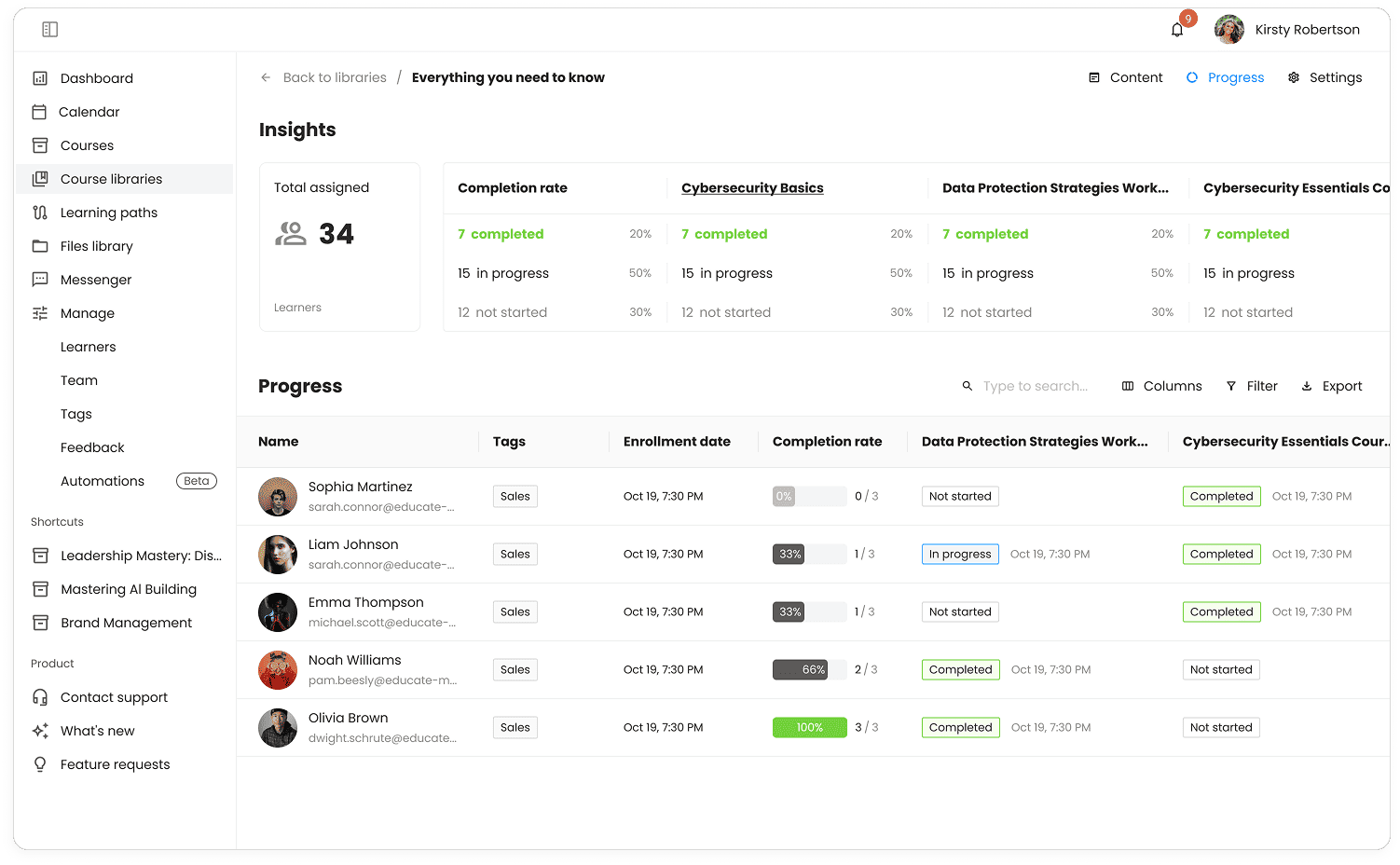ince sales are the core of a business, sales reps need to have substantial knowledge of products and services to increase business revenue. Interestingly, teams willing to invest in sales training and development technology are 57% more effective than their competitors who are not willing to make such investments.
It's no surprise that you're reading this article right now, finding sales LMS can feel like a real challenge. But don't worry, we're here to help make the process a whole lot easier for you.
What are the Benefits of Implementing LMS for Sales?
With a reliable LMS application, you will not only be able to streamline your sales training but also take care of several time-consuming activities and improve your productivity.
Some benefits of using an LMS for sales training include:
- It centralizes all your sales-related information on a single platform. Everyone from your sales reps to managers can access it anytime and anywhere. It also minimizes the risk of losing important information.
- It provides the sales team with various training models – audiobooks, infographics, process videos, etc. Your sales team can access the content and understand the concept on its own. This promotes self-directed learning, which seems to be the need of the hour.
- It will help you in delivering customized training programs. For example, as a manager, you will find that some people in your team are unable to communicate with your customers correctly, and some need more product knowledge. You can create courses for both soft skills training and product overview and deliver them accordingly. You can also create courses by integrating images, videos, infographics, quizzes, etc. to make them more interactive.
- It includes gamification programs. To keep your sales reps motivated and engaged, you can award points, badges, etc., which opens the door to healthy competition with other learners.
- It reduces disruptions. Your sales staff can easily get back to work using web-based training programs. It offers greater convenience that allows you to attend classes on time. Even if they miss the lectures, you can record the sessions and share them with your sales reps.
- It allows you to generate actionable insights. With LMS, sales managers can track their team’s performance, create reports on their progress, and provide valuable feedback.
Must-Have Features of LMS for Sales Team
Okay, I guess each of us understands the benefits of LMS for sales enablement, but how to choose the right one? What features it should include? It’s time to discuss.
- Interactive Content Delivery. An LMS should offer interactive content such as quizzes, simulations, and scenario-based learning. This engages sales reps more effectively and ensures they can apply what they've learned in real-world situations.
- Scenario-Based Simulation. This sales learning management system feature lets sales reps practice real-world situations in a risk-free environment, helping them sharpen their skills through hands-on learning. It boosts confidence, improves decision-making, and ensures they’re ready to handle any sales challenge.
- Customizable Learning Paths. The ability to create personalized learning paths helps tailor the training to individual roles and skill levels within the sales team. This ensures that each team member receives the most relevant content.
- Real-Time Analytics and Reporting. Comprehensive analytics and reporting tools provide insights into the progress and performance of learners. Managers can track key metrics to identify areas for improvement and measure the effectiveness of the training.
- Gamification Features. Incorporating gamification elements like leaderboards, badges, and rewards makes learning more engaging. It motivates sales reps to complete training modules and reinforces key concepts through competition and achievement.
- Integration with CRM Systems. Seamless integration with CRM platforms like Salesforce or HubSpot allows for better alignment between training and real-world sales activities. It helps in tracking how training impacts actual sales performance.
- Social Learning Capabilities. Features like discussion forums, peer reviews, and collaborative projects foster a sense of community. They enable sales reps to learn from each other, share best practices, and build stronger teams.
- Content Management and Authoring Tools. A robust LMS should offer easy-to-use tools for creating, managing, and updating training content. This ensures that training materials are always up-to-date and relevant to current sales strategies.
- Certification and Compliance Tracking. The ability to create certification programs and track compliance ensures that all sales reps meet necessary standards and stay informed about industry regulations. This is crucial for maintaining a high-performing sales team.
10 Best LMS For Sales Training
#1. EducateMe - Best Scenario-Based AI LMS for Sales Training

EducateMe is the perfect LMS for sales training, built to boost performance and drive revenue. The best part? The scenario-based AI assistant lets your team practice real-world sales situations - just set it up with the scenario you want to train, and you're good to go!
With interactive simulations and personalized learning paths, every rep gets the training they actually need. Real-time analytics help you track progress and fine-tune coaching for better results. And with seamless CRM integration, your training directly supports sales performance, making success easier than ever!
Key Sales Enablement Features
- AI assistant for sales simulation. Create realistic, interactive sales scenarios, allowing reps to practice pitches, handle objections, and refine their skills.

- Certificates for compliance. Ensure your sales team meets required standards by issuing certificates that verify training completion and regulatory compliance.

- Progression-based learning. Gamify the learning experience by unlocking subsequent modules only after the completion of previous sections.
- White-labeling. Maintain brand consistency across your sales training materials with customizable colors, fonts, logos, and domains.
- Interactive sales training tools. Utilize a blend of cohort-based and self-paced learning, featuring bite-sized modules, quizzes, webinars, and interactive content that keep your sales team engaged and motivated.
- Seamless integration. Connect EducateMe with your existing sales tools and CRMs, including API and Zapier integrations.
- Smart performance tracking. Monitor progress in real-time with 10+ tracking metrics, automated reports, and behavioral insights, making it easy to spot bottlenecks and optimize learning paths.

#2. Brainshark (BigTinkan)- Best for Video Coaching and Readiness Assessments

Brainshark's sales learning platform that empowers client-facing teams with the knowledge, skills, and insights needed to excel. The platform offers a comprehensive suite of tools, including readiness scorecards, content authoring, training, and video coaching.
With features like machine analysis and AI-driven assessments, this sales enablement LMS ensures that teams are not only trained but also ready to apply their skills in real-world scenarios. This data-driven approach helps organizations streamline onboarding, improve training outcomes, and ultimately drive better business results.
Pricing: Require contacting sales team
Key Features
- Readiness scorecards. This tool allows isualize team performance and identify skill gaps.
- Content authoring. Usees can create engaging training content with ease.
- Training & onboarding. They offer on-demand learning paths and courses to accelerate onboarding.
- Coaching & practice. Your team has opportunity to validate message mastery with video coaching and assessments.
- Machine analysis & scoring. Platform allows utilizing AI to streamline video scoring and provide instant feedback.
#3. MindTickle - Best for Continuous Sales Enablement and Skill Reinforcement

Mindtickle's online LMS systems for sales training is designed to transform your sales training into a continuous, dynamic process. By addressing skill gaps in real-time, fostering collaboration, and reinforcing learning through AI-powered tools, this platform helps sales teams avoid the pitfalls of forgotten training and missed opportunities.
With features like just-in-time content and seamless CRM integration, Mindtickle empowers your team to stay ahead of the competition and consistently achieve their sales targets.
Pricing: Quote-based pricing approach
Key Features
- Real-time skill gap identification. It allows you to monitor and address your sales team’s skill gaps instantly with the Mindtickle Readiness Index.
- AI-powered spaced reinforcements. You can protect and reinforce training gains over time to drive lasting behavior change and continuous improvement.
- Collaborative learning and self-coaching. Encourage teamwork and knowledge-sharing through challenges, deal room templates, and peer coaching.
- Just-in-time content access. Equip reps with easy access to critical product, feature, and industry knowledge via Asset Hub and Digital Sales Rooms.
- Seamless integration and insights. Integrate training with CRM systems, manage deals, and utilize AI-driven insights to enhance performance and forecasting.
#4. Highspot - Best for AI-Driven Sales Simulations and Performance Analytics
.png)
Highspot is an all-in-one sales training platform designed to boost sales performance, accelerate ramp time, and drive predictable revenue growth. Powered by AI-driven coaching and analytics, it helps sales teams develop critical skills, reinforce learning, and seamlessly integrate training into their daily workflows. With personalized learning paths, real-world simulations, and automated performance tracking, reps can continuously improve and apply their knowledge in live sales situations.
Pricing: Contact sales for a quote
Key Sales Training Features
- AI-driven sales simulations. Engage reps with realistic, scenario-based training powered by AI, helping them refine their pitches and objection-handling skills.
- Personalized learning paths. Tailor training experiences to individual reps with a mix of live coaching, video practice, eLearning, and certifications to maximize skill development.
- Real-time performance analytics. Track sales readiness, identify skill gaps, and measure training impact with AI-driven dashboards and competency scorecards.
- CRM and meeting integrations. Reinforce learning with seamless integrations into Salesforce, Microsoft Dynamics 365, Zoom, and Google Calendar, surfacing training insights where reps need them most.
- Gamification and certification. Keep reps engaged with leaderboards, AI-graded quizzes, skills rubrics, and customizable certifications that validate their expertise and drive continuous learning.
#5. Allego - Best for Video-Based Learning and Real-Time Sales Coaching
.png)
Allego is a leading online sales training software that enhances performance by integrating learning, content, and collaboration into a single, user-friendly application. Designed for modern sales teams, Allego provides on-demand access to training materials, enabling reps to learn at their own pace and convenience.
The platform's video-based learning approach allows sales professionals to record and share their pitches, receive real-time feedback, and continuously refine their skills. With robust analytics, managers gain insights into team performance, helping to identify areas for improvement and tailor coaching accordingly.
Pricing: Require contacting sales team
Key Features
- AI-powered conversation intelligence. Capture and analyze sales calls, identify winning moments, and provide real-time coaching to improve performance and close more deals.
- Digital sales rooms. Engage buyers with personalized, interactive sales hubs that simplify content sharing, track engagement, and shorten sales cycles by up to 50%.
- Mobile-first sales training. Provide on-the-go access to learning, allowing reps to train anytime, anywhere, with video-based coaching, microlearning, and interactive assessments.
- Channel sales enablement. Equip partner sellers with the same tools and training as direct sales teams, ensuring consistency in messaging, content adoption, and revenue growth.
- Seamless CRM & workflow integrations. Connect effortlessly with Salesforce, Microsoft Teams, Slack, and other tools to surface training, coaching, and content directly in sales workflows.
#6. Absorb LMS - Best for Mobile Sales Training Platform and Salesforce Integration

Absorb LMS is a top-rated LMS for marketing and sales designed to equip sales teams with the all the necessary tools, training, and content. This sales training software empowers salespeople to close bigger deals through mobile learning, intuitive design, and advanced AI features.
By integrating seamlessly with tools like Salesforce, Zoom, and ADP, Absorb LMS provides a centralized hub for all your sales training needs. Whether for small teams or global enterprises, Absorb LMS helps organizations optimize sales performance, drive revenue, and stay compliant with industry standards.
Pricing: Available upon a quote, a free trial is possible upon contact with support
Key Features
- Mobile learning. Your learners can access sales training anytime, anywhere via a responsive mobile app.
- Salesforce integration. It offers seamless integration of training materials with Salesforce for on-the-job learning.
- Advanced AI features. This LMS provides predictive content recommendations and gamification to enhance learning engagement.
- Comprehensive analytics. Advanced reporting tools allows you to track, measure, and improve training impact.
- Compliance and security. This platform is WCAG 2.0, GDPR, and SOC 2 compliant, with automated certification tracking.
#7. Docebo - Best for Personalized AI Learning Paths and Adaptive Training

Docebo sales learning management system helps managers & HR department to empower sales teams with personalized learning experiences, driving faster onboarding, better performance, and increased revenue. By leveraging AI-powered content recommendations, adaptive learning paths, and virtual coaching, Docebo helps sales reps close deals more effectively and efficiently.
The platform integrates seamlessly with your existing tech stack, providing a connected, data-driven environment. With mobile accessibility and always-on learning, Docebo makes training convenient for salespeople on the go.
Pricing: Docebo offers custom pricing based on the number of users and features required. Contact sales for a quote.
Key Features
- Hyper-personalized learning. AI-driven content recommendations and adaptive learning paths tailored to individual sales reps.
- Seamless integration. Connects with your tech stack for a unified sales environment.
- Mobile and embedded learning. Accessible training anytime, anywhere, even on the go.
- Data-driven insights. Tracks and measures training impact, linking it to sales performance.
- Content creation and knowledge sharing. Tools for creating and sharing training materials from top performers and SMEs.
#8. WorkRamp - Best All-in-One Sales Training Software

WorkRamp is a specialized LMS for sales team that helps your staff to achieve peak performance. Designed to boost sales performance, this all-in-one platform offers everything your sales team needs to thrive — from onboarding and skill development to continuous training and customer education.
With cutting-edge AI capabilities, seamless CRM integrations, and an intuitive user experience, WorkRamp empowers sales teams to close more deals, reduce ramp time, and drive revenue growth.
Pricing: Contact sales for a quote
Key Features
- All-in-one LMS. You can run sales training, onboarding, and continuous development on a single platform.
- AI-enhanced training. This sales LMS offers AI capabilities to create personalized, impactful sales training content that keeps your team ahead of the curve.
- CRM integrations. Seamless connection with Salesforce, Microsoft, and other essential tools to sync training with your sales processes.
- Sales enablement cloud. Equip your sales team with the knowledge and skills they need to win more deals and exceed quotas.
- Customer training solutions. Enhance customer education to boost product adoption and reduce churn, ensuring long-term customer success.
- Quick and easy setup. With a user-friendly interface, WorkRamp makes it easy to implement and engage your sales team.
#9. Maple LMS - Best Gamified Sales Learning Management System

MapleLMS is a comprehensive sales training LMS designed to rapidly onboard new sales reps and enhance their skills with minimal disruption to their workflow. By automating repetitive tasks and offering rich, off-the-shelf content, MapleLMS reduces training costs and accelerates time-to-competency.
The platform’s gamified learning features and seamless integration with CRM and other systems ensure that sales teams remain engaged, motivated, and fully equipped with all the necessary information.
Pricing: Contact sales for a quote
Key Features
- Automated online sales training. You can streamline repetitive training tasks like grading assignments, allowing for more efficient use of time and resources.
- Gamified learning. It helps to motivates and engages sales teams with badges, points, and leaderboards, making training both fun and effective.
- Seamless CRM integratio. You can connect effortlessly with existing CRM, HRMS, and ERP systems, centralizing training content and enhancing sales pipeline management.
- Off-the-shelf training content. Provides a diverse library of ready-made courses covering key sales skills like Objection Handling and Effortless Prospecting.
#10. Unlock:Learn - Seamless Sales Training LMS Within Daily Workflows

Unlock:Learn is another example of best sales training software that seamlessly integrates with your sales team’s existing workflows and CRM platforms. It maximizes content consumption and minimizes learning disruption. By delivering training directly within the flow of work, it reduces time-to-competency for new hires and ensures ongoing skill development for your entire team.
With automated course enrollment, targeted notifications, and a user-friendly interface, Unlock:Learn makes sales training efficient and effective across all devices, whether your team is in the office or on the go.
Pricing: Require contacting sales team
Key Features
- Learning in the flow of work. It integrates seamlessly with existing sales applications, placing training within your team’s daily workflow.
- Automated course enrollment and delivery. Accelerates onboarding by automatically pushing self-paced learning and tracking progress, reducing time-to-competency.
- Quizzes and surveys. Your managers can identify and address knowledge gaps in real-time, ensuring your sales team is always prepared.
- Cross-device accessibility. This sales training LMS offers a consistent and engaging learning experience across laptops, tablets, and smartphones, supporting your team wherever they are.
- User-friendly interface. This LMS simplifies the learning process with an intuitive design that maximizes content consumption and minimizes friction for sales teams.
Conclusion
For sure, organizations need a versatile and engaging solution that adapts to various learning needs and fosters continuous improvement. Sales training platforms that offer advanced features, robust gamification, and seamless integration can make all the difference in achieving training goals.
You can elevate your sales training to new heights with EducateMe LMS, the ultimate platform for gamified, engaging, and effective learning experiences.
Try our free trial today to explore its features and benefits at no cost, or book a demo with our experts to get a personalized walkthrough of the platform.
Our top picks
Scenario-Based

EducateMe
EducateMe is an LMS for sales training with AI role-play simulations that boost sales skills, track progress, and drive real performance.
Try EducateMe for freeVideo Coaching

Brainshark
Sales enablement LMS with AI assessments, video coaching, and analytics to boost readiness and real-world performance.
Try EducateMe for freeSales Enablement

Mindtickle
AI-powered sales training LMS that closes skill gaps in real time, reinforces learning, and drives consistent sales success.
Try EducateMe for free






















